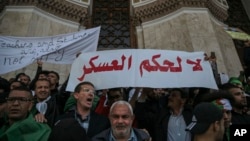Algeria's powerful army chief on Wednesday backed the country's newly appointed interim leader, and said the military will watch over the process to prepare for presidential elections, but suggested it doesn't want to intervene.
Ahmed Gaid Salah, speaking at a regional military headquarters in Oran, said it is "unreasonable" to organize elections in the three-month transition period allotted by the constitution without institutional guidance, such of that of Abdelkader Bensalah.
The head of the Senate was appointed the day before to replace former President Abdelaziz Bouteflika, who was pressured by massive protests to step down after two decades in office. Bouteflika had tried to hang on, but the pressure increased when Gaid Salah withdrew his support and denounced the corrupt "gang" running the country.
Under the constitution, Bensalah should serve as interim leader for a maximum of 90 days while elections are organized. However, protesters who have held massive and peaceful nationwide demonstrations for seven weeks reject Bensalah and others close to Bouteflika, demanding a complete change in the system that has governed the gas-rich nation since its independence from France in 1962.
In a much-awaited speech Wednesday, provided by the official APS news agency and the private site TSA Algerie, the army chief Gaid Salah said the judicial system would pursue corruption cases and resurrect those that had been dropped.
He warned anew of an alleged foreign hand he contended is promoting certain individuals to run the transition and manipulating protesters to destabilize the nation and "seed discord among the children of the people ... aimed at leading the country to a constitutional void."
He did not say who he alleged was interfering, but referred to "certain foreign parties, considering their historic record" — a likely veiled reference to former colonial power France.
From the start of the nation's political crisis, the army has "categorically rejected" intervening, Gaid Salah said, stressing that it will oversee the transition and stand as a "solid support for the people." However, he warned that "persistent unrealizable demands" would impact the economy and buying power — a motor behind the protests in a nation with high unemployment and a very young population.
He pleaded for "patience ... and lucidity" to ensure peace and form the basis for a "state of law and institutions."




